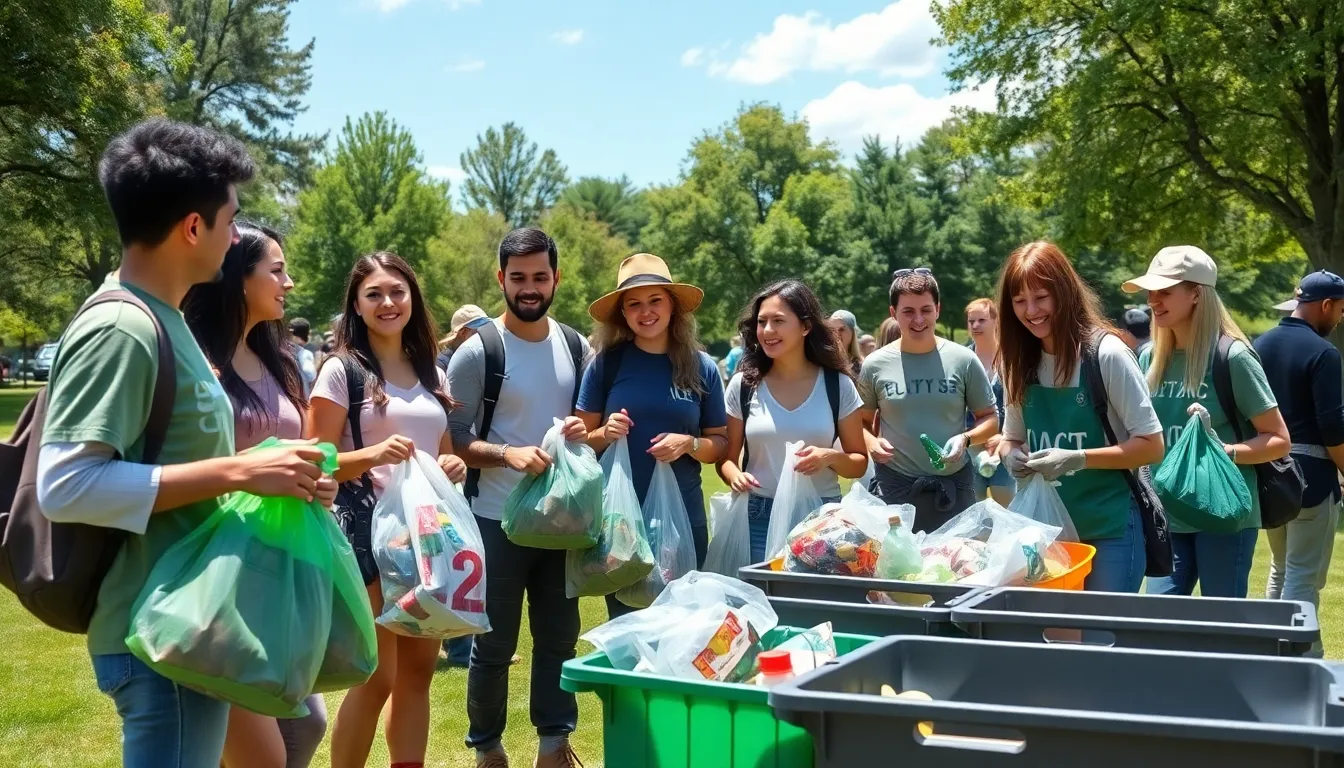In a world overflowing with plastic and waste, the concept of zero waste might sound like a lofty dream—like trying to find a unicorn in a landfill. But it’s not just for eco-warriors or hipsters with trendy tote bags. Zero waste is about making small, impactful changes that can lead to a cleaner planet and a healthier lifestyle. Imagine a life where your trash can isn’t overflowing but rather a tiny compost bin that barely takes up space.
Table of Contents
ToggleWhat Is Zero Waste?
Zero waste refers to an environmental philosophy aimed at reducing waste generation through a systematic approach. This concept encourages individuals and communities to rethink consumption habits, focusing on minimizing waste at its source. Practices include reusing, recycling, and composting materials rather than discarding them.
An integral part of zero waste involves rejecting single-use plastics and disposable items. By choosing sustainable products, a significant reduction in waste occurs. Educating oneself about materials helps inform smarter choices when shopping.
Implementing a zero waste lifestyle often begins with small, actionable steps. One might start by using reusable bags, bottles, and containers. Composting organic waste transforms kitchen scraps into nutrient-rich soil, effectively keeping waste out of landfills.
Furthermore, the aim extends beyond individual actions to encompass larger systems. Organizations and governments play a vital role in promoting policies that support waste reduction. Engaging with community initiatives can amplify collective efforts for a sustainable future.
Tracking waste output reveals progress over time. Keeping a waste diary or using apps helps identify patterns and areas for improvement. Zero waste advocates often share strategies and successes to inspire others on similar journeys.
The overarching goal of zero waste emphasizes a circular economy, where resources are continually reused. By fostering responsible consumption and promoting sustainability, zero waste contributes significantly to environmental protection and resource conservation.
The Principles of Zero Waste

Zero waste encompasses several core principles that guide individuals and communities toward sustainable living. These principles prioritize eliminating waste and conserving resources, making it easier to adopt a zero waste lifestyle.
Refuse
Refusing unnecessary items prevents waste before it starts. Single-use plastics, promotional freebies, and excessive packaging contribute heavily to landfill issues. Opting out of these items means actively choosing what’s brought into a home. People can practice this by bringing their containers and bags, rejecting disposable products and minimizing clutter effectively.
Reduce
Reducing consumption involves evaluating needs versus wants. It promotes choosing quality over quantity, resulting in less waste generated. Purchasing fewer items leads to less packaging waste and resource extraction. Focusing on essentials encourages mindful shopping, which can sustain individual habits and a healthier environment.
Reuse
Reusing items extends their life cycle and reduces resource depletion. Practical alternatives include glass jars for storage or cloth bags for shopping, both promoting sustainability. Creative ways to repurpose items can inspire others and foster community engagement. Many choose to prioritize durable products designed for repeated use, minimizing reliance on disposables.
Recycle
Recycling helps divert materials from landfills, but it works best as a last resort. Proper sorting and cleaning of recyclables ensure they don’t contaminate the process. Communities benefit from accessible recycling programs that encourage responsible disposal. Understanding local guidelines can maximize recycling efforts and enhance resource recovery.
Rot
Rotting organic waste through composting enriches soil and reduces chemical fertilizers. Organic materials, such as vegetable scraps and yard waste, contribute significantly to landfill volume. By composting, individuals create nutrient-rich soil while diverting waste from landfills. Enthusiasts often share tips and techniques to inspire broader participation in composting efforts.
Benefits of Zero Waste
Adopting a zero waste philosophy leads to various significant benefits, ranging from environmental impact to economic savings. Each benefit plays a crucial role in promoting sustainable living and community involvement.
Environmental Impact
Zero waste practices significantly reduce greenhouse gas emissions. By minimizing waste generation, landfills see decreased methane releases. Conserving resources becomes easier through practices like reusing and recycling. Notably, less reliance on new materials helps preserve natural habitats. Additionally, focusing on composting enriches soil quality, improving local ecosystems. Cleaner environments emerge as communities engage in waste reduction efforts. Finally, these actions collectively address global environmental challenges.
Economic Savings
Implementing a zero waste lifestyle results in substantial cost reductions. People save money by purchasing fewer products and prioritizing quality items. Relying on reusable items minimizes the need for single-use alternatives. Investing in reusable containers and bags proves economically beneficial over time. Reduced waste impacts disposal costs as well, leading to lower waste management fees. Successful community recycling initiatives foster local economies by creating job opportunities. Over time, adopting these strategies leads to a more sustainable financial future for individuals and communities alike.
Community Engagement
Zero waste encourages community collaboration and engagement. Local groups often organize clean-up events, fostering a sense of unity. Participating in workshops on sustainability helps educate individuals on responsible consumption. Sharing strategies amplifies collective efforts, creating a supportive environment for change. Community gardens promote composting while providing access to fresh produce. Active engagement in local initiatives has a ripple effect, inspiring neighboring areas. Ultimately, a zero waste mindset strengthens community ties, enhancing the overall quality of life.
Challenges in Adopting Zero Waste
Adopting a zero waste lifestyle presents several challenges that individuals and communities often face.
Behavioral Changes
Behavioral changes represent a significant hurdle; habits developed over time can be difficult to alter. Transitioning to zero waste involves redefining consumption patterns and resisting the allure of convenience. Many individuals find it challenging to refuse single-use items, often leading to accumulated waste in their households. Adjusting daily routines, such as preparing meals at home or carrying reusable alternatives, requires commitment. Moreover, education plays a crucial role in inspiring meaningful lifestyle shifts. Advocates emphasize the need for persistent efforts and strategies to support consistent behavioral changes.
Accessibility of Resources
Accessibility of resources serves as another challenge in adopting a zero waste approach. Availability of sustainable products may vary significantly between urban and rural areas. Individuals in remote locations often struggle to find local zero waste shops or bulk purchasing options. Online shopping can provide alternatives but may not always ensure eco-friendly shipping and packaging. Affordability also factors into the equation; ethical and sustainable products sometimes come with higher price tags, leading to economic barriers for some households. Addressing these discrepancies requires community engagement and support to enhance resource accessibility for all.
Adopting a zero waste lifestyle is a powerful way to contribute to environmental sustainability while enhancing personal and community well-being. By embracing the core principles of refuse, reduce, reuse, recycle, and rot, individuals can create meaningful change in their daily lives. Small actions can lead to significant impacts, inspiring others to join the movement.
While challenges exist in making this transition, the benefits far outweigh the obstacles. With collective efforts and community support, it’s possible to foster a culture of sustainability that resonates beyond individual households. A commitment to zero waste not only protects the planet but also cultivates a healthier, more connected community. Every step taken toward reducing waste is a step toward a brighter future for all.



